外研版(2019)高中英语必修第一册Unit2 Exploring English Listening&Speaking-课件(25张ppt)
文档属性
| 名称 | 外研版(2019)高中英语必修第一册Unit2 Exploring English Listening&Speaking-课件(25张ppt) | 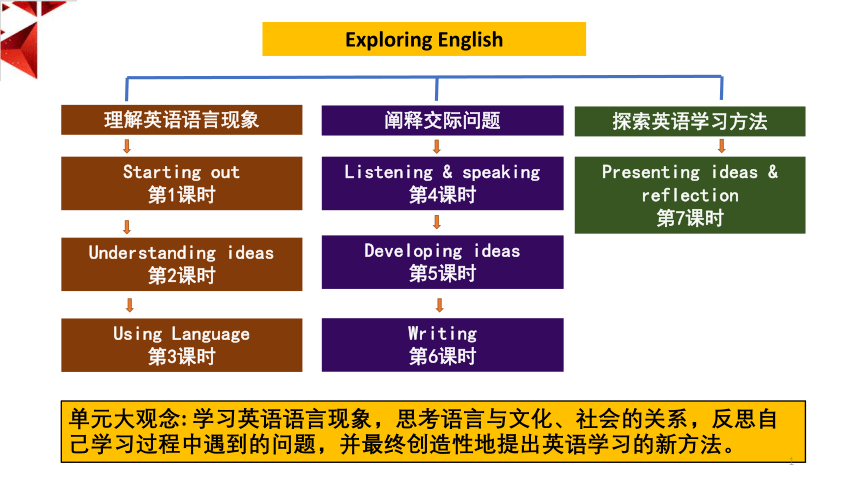 | |
| 格式 | zip | ||
| 文件大小 | 29.6MB | ||
| 资源类型 | 教案 | ||
| 版本资源 | 外研版(2019) | ||
| 科目 | 英语 | ||
| 更新时间 | 2022-06-09 16:08:17 | ||
图片预览


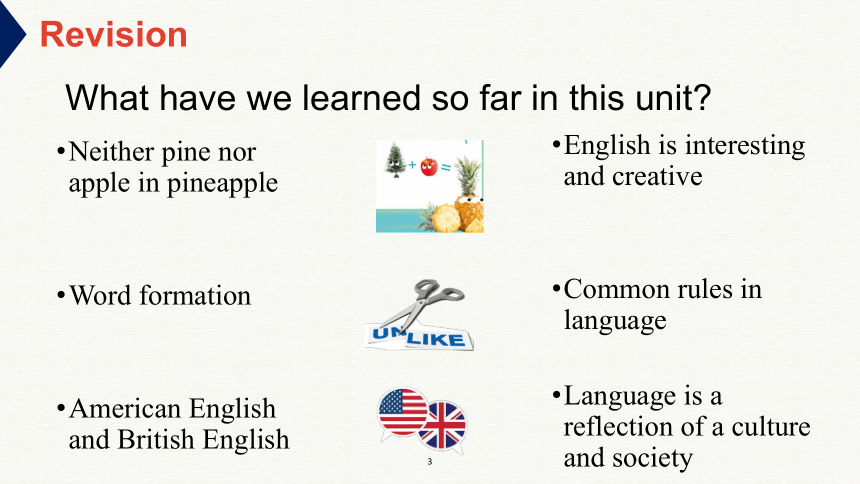
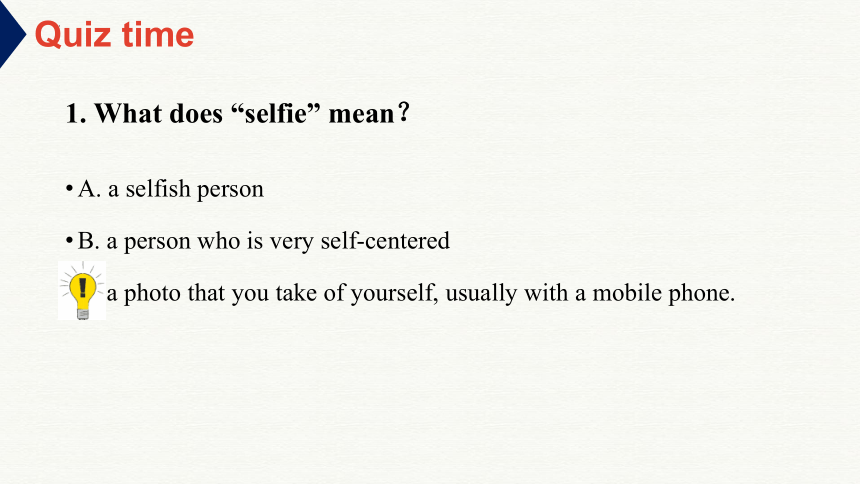
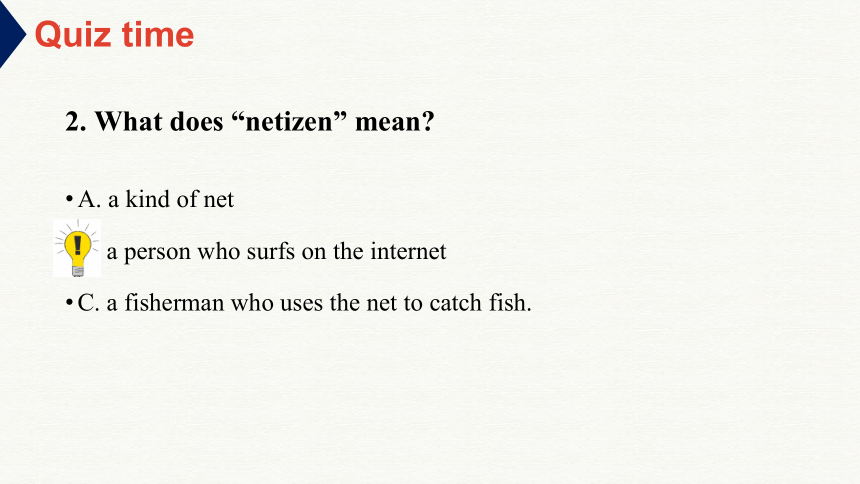
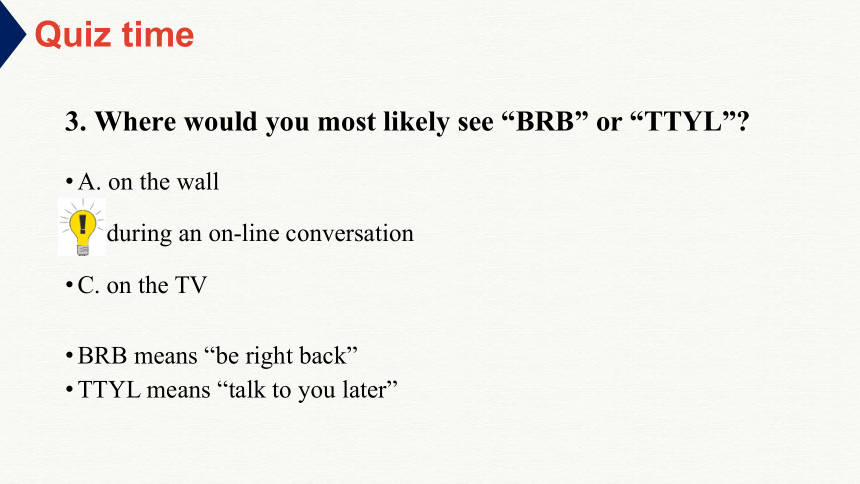
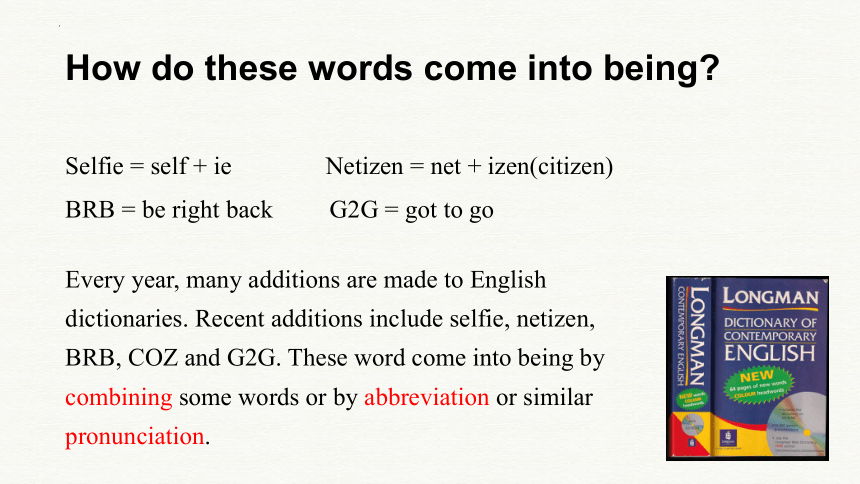
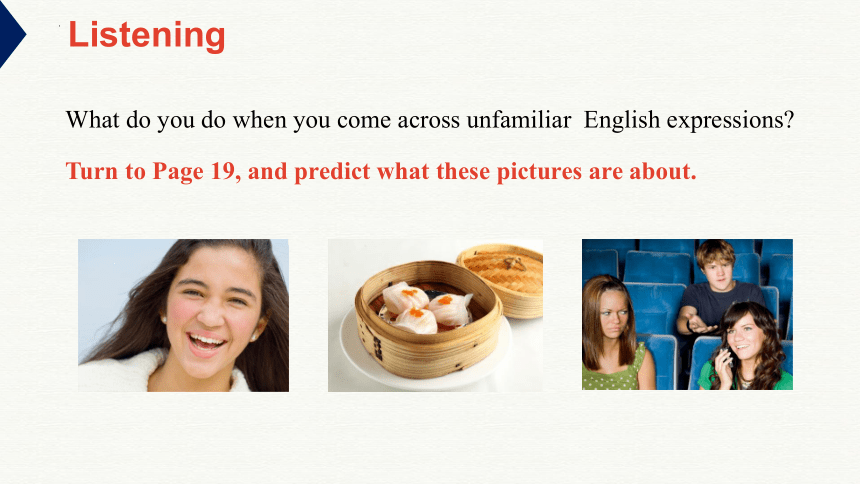
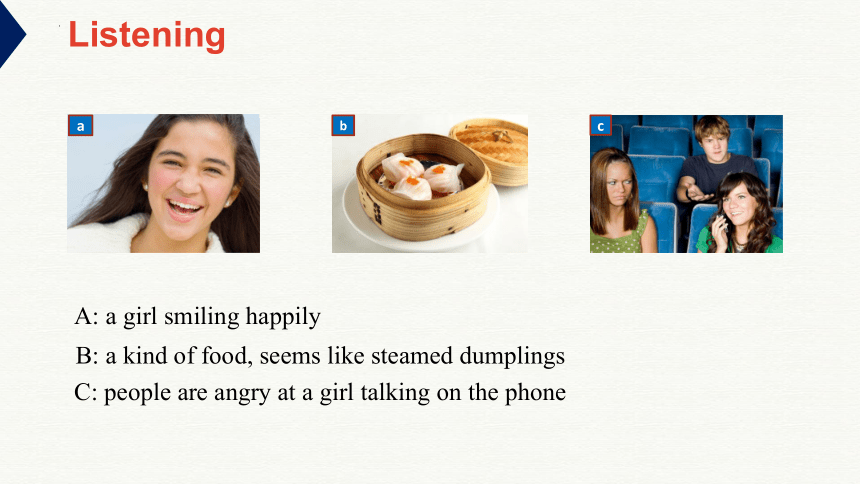
文档简介
(共25张PPT)
Exploring English
理解英语语言现象
阐释交际问题
探索英语学习方法
Starting out
第1课时
Understanding ideas
第2课时
Using Language
第3课时
Listening & speaking
第4课时
Developing ideas
第5课时
Presenting ideas & reflection
第7课时
单元大观念: 学习英语语言现象,思考语言与文化、社会的关系,反思自己学习过程中遇到的问题,并最终创造性地提出英语学习的新方法。
Writing
第6课时
1
Unit 2 Exploring English
Listening & Speaking
What have we learned so far in this unit
Neither pine nor apple in pineapple
Word formation
American English and British English
English is interesting and creative
Common rules in language
Language is a reflection of a culture and society
Revision
1. What does “selfie” mean?
A. a selfish person
B. a person who is very self-centered
C. a photo that you take of yourself, usually with a mobile phone.
Quiz time
2. What does “netizen” mean
A. a kind of net
B. a person who surfs on the internet
C. a fisherman who uses the net to catch fish.
Quiz time
3. Where would you most likely see “BRB” or “TTYL”
A. on the wall
B. during an on-line conversation
C. on the TV
BRB means “be right back”
TTYL means “talk to you later”
Quiz time
How do these words come into being
Selfie = self + ie Netizen = net + izen(citizen)
BRB = be right back G2G = got to go
Every year, many additions are made to English dictionaries. Recent additions include selfie, netizen, BRB, COZ and G2G. These word come into being by combining some words or by abbreviation or similar pronunciation.
What do you do when you come across unfamiliar English expressions
Turn to Page 19, and predict what these pictures are about.
Listening
a
b
c
A: a girl smiling happily
B: a kind of food, seems like steamed dumplings
C: people are angry at a girl talking on the phone
Listening
a
b
c
Conversation 1
Conversation 2
Conversation 3
Listening
Words Meaning Origin
Dim sum A kind of traditional _________ From _________
_________ Using a cellphone without caring about others A combination of
_________and________
_________ A shorter way of saying _________ From the internet
Listen again and complete the table
Words Meaning Origin
Dim sum A kind of traditional _________ From _________
_________ Using a cellphone without caring about others A combination of
_________and________
_________ A shorter way of saying _________ From the internet
Chinese food
the
Guangdong dialect
cellfish
selfish
LOL
“laugh out loud”
cellphone
Listen again and complete the table
Words Meaning Origin
Dim sum A kind of traditional _________ From _________
_________ Using a cellphone without caring about others A combination of
_________and________
_________ A shorter way of saying _________ From the internet
名词,传统物品
地点,国家
地区名字
名词,
合成词
名词
名词
名词,
网络用语
名词,习语/俗语
Prediction
Presenter: Conversation 1
A: I'm going to buy something to eat from the restaurant downstairs. Would you like anything
B: Oh yes, please. Could you order me some dim sum
A: Some what
B: Dim sum.
A: What kind of food is that
B: It's a kind of traditional Chinese food from South China, including dumplings, spring rolls, meatballs and so on.
A: Oh, I see. So “dim sum” comes from Chinese
B: Yes, that's right. In fact, it comes from the Guangdong dialect. In Mandarin or Putonghua it would be “dian xin”.
A: Well, it sounds good! Maybe I'll order that as well...
1.
2.
Presenter: Conversation 2
A: How was the movie
B: It was great, but some one in front of me was talking so loudly on her phone.
A: How cellfish! B: Yes, I agree. Very selfish.
A: Ah, do you know what I mean by “cellfish”
B: Of course! When you say “selfish”, you mean only caring about yourself and not about other people, right
A: That's what “selfish” with an “s” means, but I'm talking about “cellfish” starting with the letter “c”.
B: I haven't heard that word before. What does it mean
A: It means using a cellphone in a way that shows you don't care about the other people around you.
B: That's interesting. How do you spell it
A: C-E-L-L-F-I-S-H. It's the words “cellphone” and “selfish” put together.
B: Oh, I see...
3.
4.
Presenter: Conversation 3
A: Darling, could you take a look at this message from Lucy I have no idea what she's talking about...again.
B: What has she said
A: Well, I told her a joke that Bob told me today at the office, and, as you see, she replied “LOL”. What's that for
B: Oh, LOL! It's a shorter way of saying “laugh out loud”.
A: I've never seen or heard that before. Where does it come from
B: It was first used on the Internet. You use it to show you think something is very funny.
A: Oh, okay.
B: Keep up with the times, darling!
6.
7.
Make sure the part of speech of the word we need to fill in the table
Guess the meaning of the word
Listen to the recording and pay attention to the context.
How do we get the correct answers
Video time
From @jonathanpeng
How do the speakers ask for and explain the meanings of the words
how to ask:
1. What kind of food is that
2. It's a kind of...
3. Do you know what I mean by...
4. I beg your pardon
5. What does … mean
6. What’s that for
7. When you say… you mean …, right
how to explain:
1. It means...
2. It’s a short way of saying…
3. It's..., It was first used...
4. You use it to…
5. It is a …, and its function is mainly...
Useful expressions:
Speaking time
Act out the conversation to ask for and explain the meanings of the expressions.
Role A
Role B
Role A
You are a waiter/ waitress in a restaurant. You ask your customer whether he/she needs a doggy bag. (Notes: A “doggy bag” is a bag or box in which you take unfinished food home from a restaurant.)
Role B
You are asking for the bill in a restaurant. The waiter/ waitress asks you if you need a doggy bag. You don't know what it is and ask him/her to explain.
Speaking time
Role B:
Role A:
Role B:
Role A:
Role B:
Role A:
Role B:
Excuse me. Can I have my bill now
I hope you enjoy your dinner here. Oh, I see there are still some food on your plate. Do you need a doggy bag
A what
A doggy bag.
What does a doggy bag mean
A doggy bag is a bag or box. You use it to take unfinished good home from a restaurant.
Oh I see. Thanks a lot. That’s exactly what I need.
Role play
Act out the conversation to ask for and explain the meanings of the expressions.
Role A
Role B
Role A
You see a sign in a supermarket saying “3 for 2”. You don’t know what it means and ask the shop assistant to explain.
Role B
You are a shop assistant. A customer asks you what “3 for 2” means. (Notes: “3 for 2” means that if you buy two items, you get a third one for free.)
Speaking time
Summary
Unfamiliar English expressions.
Listening skills (prediction, key words, etc)
Speaking practice (how to ask and explain unfamiliar English expressions)
Search unfamiliar English words on the internet.
Create a setting and conduct a conversation to ask and explain these words.
Homework
Thank you!
Exploring English
理解英语语言现象
阐释交际问题
探索英语学习方法
Starting out
第1课时
Understanding ideas
第2课时
Using Language
第3课时
Listening & speaking
第4课时
Developing ideas
第5课时
Presenting ideas & reflection
第7课时
单元大观念: 学习英语语言现象,思考语言与文化、社会的关系,反思自己学习过程中遇到的问题,并最终创造性地提出英语学习的新方法。
Writing
第6课时
1
Unit 2 Exploring English
Listening & Speaking
What have we learned so far in this unit
Neither pine nor apple in pineapple
Word formation
American English and British English
English is interesting and creative
Common rules in language
Language is a reflection of a culture and society
Revision
1. What does “selfie” mean?
A. a selfish person
B. a person who is very self-centered
C. a photo that you take of yourself, usually with a mobile phone.
Quiz time
2. What does “netizen” mean
A. a kind of net
B. a person who surfs on the internet
C. a fisherman who uses the net to catch fish.
Quiz time
3. Where would you most likely see “BRB” or “TTYL”
A. on the wall
B. during an on-line conversation
C. on the TV
BRB means “be right back”
TTYL means “talk to you later”
Quiz time
How do these words come into being
Selfie = self + ie Netizen = net + izen(citizen)
BRB = be right back G2G = got to go
Every year, many additions are made to English dictionaries. Recent additions include selfie, netizen, BRB, COZ and G2G. These word come into being by combining some words or by abbreviation or similar pronunciation.
What do you do when you come across unfamiliar English expressions
Turn to Page 19, and predict what these pictures are about.
Listening
a
b
c
A: a girl smiling happily
B: a kind of food, seems like steamed dumplings
C: people are angry at a girl talking on the phone
Listening
a
b
c
Conversation 1
Conversation 2
Conversation 3
Listening
Words Meaning Origin
Dim sum A kind of traditional _________ From _________
_________ Using a cellphone without caring about others A combination of
_________and________
_________ A shorter way of saying _________ From the internet
Listen again and complete the table
Words Meaning Origin
Dim sum A kind of traditional _________ From _________
_________ Using a cellphone without caring about others A combination of
_________and________
_________ A shorter way of saying _________ From the internet
Chinese food
the
Guangdong dialect
cellfish
selfish
LOL
“laugh out loud”
cellphone
Listen again and complete the table
Words Meaning Origin
Dim sum A kind of traditional _________ From _________
_________ Using a cellphone without caring about others A combination of
_________and________
_________ A shorter way of saying _________ From the internet
名词,传统物品
地点,国家
地区名字
名词,
合成词
名词
名词
名词,
网络用语
名词,习语/俗语
Prediction
Presenter: Conversation 1
A: I'm going to buy something to eat from the restaurant downstairs. Would you like anything
B: Oh yes, please. Could you order me some dim sum
A: Some what
B: Dim sum.
A: What kind of food is that
B: It's a kind of traditional Chinese food from South China, including dumplings, spring rolls, meatballs and so on.
A: Oh, I see. So “dim sum” comes from Chinese
B: Yes, that's right. In fact, it comes from the Guangdong dialect. In Mandarin or Putonghua it would be “dian xin”.
A: Well, it sounds good! Maybe I'll order that as well...
1.
2.
Presenter: Conversation 2
A: How was the movie
B: It was great, but some one in front of me was talking so loudly on her phone.
A: How cellfish! B: Yes, I agree. Very selfish.
A: Ah, do you know what I mean by “cellfish”
B: Of course! When you say “selfish”, you mean only caring about yourself and not about other people, right
A: That's what “selfish” with an “s” means, but I'm talking about “cellfish” starting with the letter “c”.
B: I haven't heard that word before. What does it mean
A: It means using a cellphone in a way that shows you don't care about the other people around you.
B: That's interesting. How do you spell it
A: C-E-L-L-F-I-S-H. It's the words “cellphone” and “selfish” put together.
B: Oh, I see...
3.
4.
Presenter: Conversation 3
A: Darling, could you take a look at this message from Lucy I have no idea what she's talking about...again.
B: What has she said
A: Well, I told her a joke that Bob told me today at the office, and, as you see, she replied “LOL”. What's that for
B: Oh, LOL! It's a shorter way of saying “laugh out loud”.
A: I've never seen or heard that before. Where does it come from
B: It was first used on the Internet. You use it to show you think something is very funny.
A: Oh, okay.
B: Keep up with the times, darling!
6.
7.
Make sure the part of speech of the word we need to fill in the table
Guess the meaning of the word
Listen to the recording and pay attention to the context.
How do we get the correct answers
Video time
From @jonathanpeng
How do the speakers ask for and explain the meanings of the words
how to ask:
1. What kind of food is that
2. It's a kind of...
3. Do you know what I mean by...
4. I beg your pardon
5. What does … mean
6. What’s that for
7. When you say… you mean …, right
how to explain:
1. It means...
2. It’s a short way of saying…
3. It's..., It was first used...
4. You use it to…
5. It is a …, and its function is mainly...
Useful expressions:
Speaking time
Act out the conversation to ask for and explain the meanings of the expressions.
Role A
Role B
Role A
You are a waiter/ waitress in a restaurant. You ask your customer whether he/she needs a doggy bag. (Notes: A “doggy bag” is a bag or box in which you take unfinished food home from a restaurant.)
Role B
You are asking for the bill in a restaurant. The waiter/ waitress asks you if you need a doggy bag. You don't know what it is and ask him/her to explain.
Speaking time
Role B:
Role A:
Role B:
Role A:
Role B:
Role A:
Role B:
Excuse me. Can I have my bill now
I hope you enjoy your dinner here. Oh, I see there are still some food on your plate. Do you need a doggy bag
A what
A doggy bag.
What does a doggy bag mean
A doggy bag is a bag or box. You use it to take unfinished good home from a restaurant.
Oh I see. Thanks a lot. That’s exactly what I need.
Role play
Act out the conversation to ask for and explain the meanings of the expressions.
Role A
Role B
Role A
You see a sign in a supermarket saying “3 for 2”. You don’t know what it means and ask the shop assistant to explain.
Role B
You are a shop assistant. A customer asks you what “3 for 2” means. (Notes: “3 for 2” means that if you buy two items, you get a third one for free.)
Speaking time
Summary
Unfamiliar English expressions.
Listening skills (prediction, key words, etc)
Speaking practice (how to ask and explain unfamiliar English expressions)
Search unfamiliar English words on the internet.
Create a setting and conduct a conversation to ask and explain these words.
Homework
Thank you!
